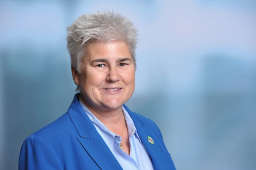
The UT Dallas Diversity Lecture Series resumed Feb. 6 at the Naveen Jindal School of Management with a talk by Jindal School alumna Beth Gerwe, MS’91, who spoke about ways businesses can gain traction by embedding diversity and inclusion in their corporate cultures.
Gerwe, managing director of Deloitte Tax LLP in Dallas and the North Texas inclusion leader for Deloitte, spoke about “Unleashing the Power of Inclusion: Attracting and Engaging the Evolving Workforce.” She discussed findings of a survey Deloitte recently completed in collaboration with the Billie Jean King Leadership Initiative.
“It’s not surprising that organizations are striving to create inclusive cultures,” Gerwe said. “But they struggle with it.”
Another survey, conducted by Bersin, Deloitte’s digital research library for human resources and talent acquisition, showed that 71 percent of surveyed companies are aspiring to create an inclusive culture. But only 12 percent feel that they have achieved that, Gerwe said.
Bersin’s research also stated companies that have an inclusive culture are six times more likely to innovate than those that do not. They are also six times more likely to anticipate change and react effectively to that change.
In addition, they are twice as likely to meet or exceed their financial goals.
“How do you move the needle?” Gerwe asked. “It’s important not only how inclusion looks, but it’s also very important how inclusion feels. What does that look like, and how do you change that?”
According the survey results, it often comes out in day-to-day interactions.
“This is not about programs,” she said. “It’s about creating culture so that people feel they belong.”
Gerwe explained that the “tone at the top” is a critical factor to achieving an inclusive culture. That tone includes building expectations into leadership performance frameworks. Leaders who model inclusivity are intentional in mentoring and sponsoring employees who are different from them. Clients often expect to see diverse teams that match their own teams not only in terms of race and gender but also in different approaches to problem solving. Having transparent, authentic leaders is also often crucial to creating a culture in which employees feel a sense of trust and belonging.
Building an inclusive culture also necessitates that companies recognize an individual employee has many identities, Gerwe said. An employee who is African-American might also see herself as a runner, a spiritual person, a parent and a creative thinker. By recognizing the varied aspects of each individual, companies can better increase employee engagement.
“There are all these different dimensions to me,” she said. “Don’t put me in one box.”
One of the ways Deloitte is strengthening their inclusive culture is through inclusion councils, which connect people through common passions and interests. They bring together people from different areas of the business, backgrounds, and experiences to participate in events related to community impact, well-being, development and inclusion — resulting in broader engagement.
“We’re finding ways — that are important — through these inclusion councils in our office, in our local environment, [where we can] make people feel more connected,” Gerwe said.






